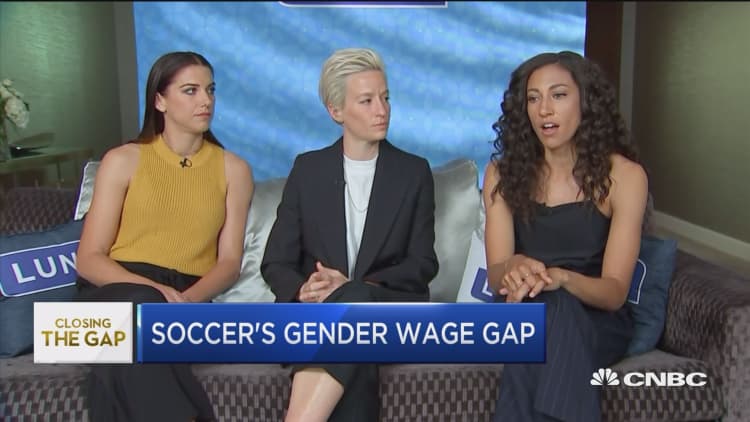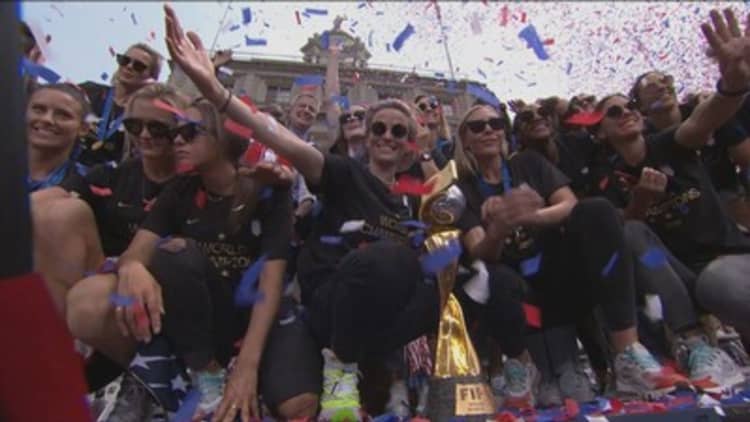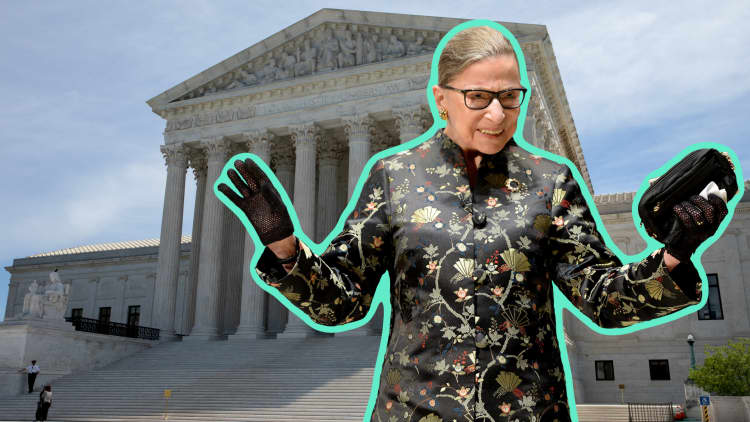Mia Hamm played her first game for the U.S. Women's National Soccer Team (USWNT) in 1987, when she was just 15 year old. She led the team to two World Cup victories and two Olympic gold medals and held the record for most international goals scored until 2013, reaching a level of visibility that few female athletes can claim.
She's also been a leader in the team's fight for equal pay.
After winning the 1999 World Cup, Hamm and the rest of the team threatened to boycott the 2000 Olympics and successfully bargained for a five-year contract that guaranteed members of the UWSNT provisions that included a $2,000 appearance fee for each of the 27 preparatory matches leading up to the games, which at the time was equal to the men's team's appearance fee.
But nearly 20 years later, the soccer pay gap has expanded. In March, 28 members of the USWNT filed a lawsuit against the U.S. Soccer Federation (USSF) for gender discrimination and unequal pay. The lawsuit claims that if the men's and women's teams won each of the 20 non-tournament games they are contractually required to play, women's team players would be paid roughly 38% of what the men would be paid. And when the 2019 FIFA Women's World Cup began, it set off a new wave of conversation on the issue of equal pay.
"What's happening right now is not just happening in soccer but across the country," Hamm told CNBC Make It at an event sponsored by Johnnie Walker and nonprofit Ladies Get Paid. She shared what she's learned from being part of a decades-long fight for pay equality, and what women and businesses can learn from the fight being waged by the USWNT.
Demonstrate value
If soccer or any other industry is interested in closing the gap between men and women, Hamm says, they need to be ready to make an investment.
"You invest where you see value," says Hamm. "The fact that people didn't see women as valuable is a mistake and also a detriment to society."
During the USWNT's negotiation in 2000, Hamm says she learned that preparation is essential, but so is unity. "That was important for us. We had a clear message of what we were advocating for and everyone felt supported by one another."
But ultimately, to advance your cause, you have to demonstrate undeniable value.
"We were saying, 'Hey, it's worth it for us not to go the Olympics, and if you want to go find 20 other players, go ahead,'" she says. "Similar to the Women's National Team now, [in 2000] we had the numbers. We had just won a World Cup and they couldn't say people won't come watch us play."
Invest in women
Hamm stresses that investing in women isn't just a social stance, it's a smart business move. Hamm links FIFA's increased investment in women's soccer over the past several years to the sport's increased TV viewership. "It just makes good business sense," she says. "We've been screaming this for so long."
The biggest market the USWNT reaches is families with children. Investing in developing this fan-base could build a generation of life-long supporters, fans and consumers. Hamm also points to the large number of brands that have signed on in support of the U.S. National Soccer program, in large part, she says, because of the strength of the USWNT.
The USSF boasts an impressive list of corporate sponsors and partners including Volkswagen, Nike, AT&T, Johnson & Johnson, Anheuser-Busch, Powerade, Coca-Cola, Secret, Continental Tire, TAG Heuer, Deloitte and Visa.

As the team's popularity has grown, so has the eagerness of brands to be associated with the USWNT and their message. In April, on Equal Pay Day, LUNA Bar announced that it would pay the 23 members of the USWNT roster $31,250 in order to cover the disparity between the bonuses paid to the women and men's teams. On July 9th, two days after the USWNT won the 2019 World Cup, insurance company Allstate announced a multi-year partnership with the team to become the group's presenting sponsor of the team's victory tour.
"The U.S. women's national team gives all these sponsors and U.S. Soccer immediate credibility," says Hamm. "We're hearing actual comments that are like, 'We want to be attached to the U.S. Women's National Team, so we're a part of U.S. Soccer."
Leadership is key
Leadership, says Hamm, is a key part of closing the gender pay gap. "Now that you have more women at higher positions at FIFA it's making a difference," she says.
In May 2016, Fatma Samoura became the first female Secretary General of FIFA. In October 2018, she led the launch of FIFA's first-ever global strategy for women's football.
"The women's game is a top priority for FIFA and via our new strategy we will work hand-in-hand with our 211 member associations around the world to increase grassroots participation, enhance the commercial value of the women's game and strengthen the structures surrounding women's football to ensure that everything we do is sustainable and has strong results," she said at the time of the announcement, adding that the initiative would "make football more accessible to girls and women and encourage female empowerment, a subject of great importance, now more than ever before."

On July 31st, FIFA voted to expand the number of teams participating in the FIFA Women's World Cup from 24 to 32. FIFA President Gianni Infantino credited the success of this year's Women's World Cup in France to the organizations increased investment.
Hamm says that having women in leadership at FIFA is having a positive impact and it can have an impact at other organizations, too.
"Your management needs to reflect your workforce." says Hamm. "Until it does, we're not going to close the gender pay gap at the rate that it needs to be closed."
Like this story? Subscribe to CNBC Make It on YouTube!
Don't miss:



